Article
It doesn’t work out that well usually. I get obsessive about things and, before I know it, I’m taking it too far. When the pandemic started, I felt so out of control that I decided the only thing to do was to up my exercise. It would make me stronger, I reasoned, a good position to be in when a deadly virus was making its way through the population. So I ran – something I’ve always done, but I really pushed myself. I upped my running to 12km a day, every day. No matter the weather, no matter what my body was saying (“listen to your body” is another phrase I’ve always ignored). It was the only thing that was normal and doable. Sitting on the couch was not for me. Being gentle on myself was stupid. It turns out: I was stupid.
This summer I started feeling knackered. I kept going, trying to kickstart the usual relief I’d get from running. It didn’t come back, but I didn’t stop trying. I ran different routes, longer routes, pushing myself up hills and not stopping even when my legs felt like lead. I took walking breaks in between sprints, silently panicking that I’d lost the capacity to do it at all.
The panic was justified. If I didn’t have running, I wouldn’t be able to keep a lid on my anxiety. Running has been the main tool in my arsenal for so long, the idea of it no longer working its magic was terrifying.
And then, in high summer, I just stopped. I was too tired, too anxious, too jittery to run. I was hungry, so hungry. I spent a week not moving at all. My step count (another thing I check in on as if it can measure my mental health in steps) dropped to triple digits. I felt as if I was a hamster who’d tumbled off the wheel and wouldn’t be able to get back on.
Running long stretches without a break for 18 months hadn’t guarded against anxiety or low mood. Instead, I was sat on the couch feeling diabolical and let down. Slowly, far too slowly, I started to see that perhaps running wasn’t the issue – instead I’d taken something helpful and made it work against me. Ice cream is delicious until you eat so much you feel sick. Wine is manna from the gods unless you down a bottle of it. The key to enjoyment might actually be moderation. And I felt so dumb for falling down such a big hole.
Running was one of the great joys of my life, and I’d made it into a chore. I’d given it magical powers it didn’t have, and didn’t even promise to have. It couldn’t change the fact that we were living through an unprecedented global event. It couldn’t give me back certainty and control. And yet every time a run didn’t make me feel better, I doubled down and ran more instead of looking for other avenues of relief – or, even more importantly, accepting the uncertainty and worry that we were all feeling.
Obsessive exercise is not uncommon. It initially feels like a healthy way to get rid of stress, and maintain control, which is why one can let it carry on without realising it’s a problem. You reason that you’re doing something good for yourself, how can that be wrong? You ignore your body telling you it’s tired. You brush off the suspicion that it might not be working so well. You neglect other coping strategies. You are a horse, wearing blinkers, focused on running straight ahead.
At some point, you’ve got to accept when something isn’t working for you in the way that it once did. It’s hard to do that. I don’t want to stop running, I don’t ever want to lose that joyful feeling when the rush hits and you sprint through the park. But I’ve stopped 12km slogs. I’ve stopped going every day. I am forcibly moderating myself. I’ve started weightlifting again, something I told myself I didn’t have time for because I was a runner. And I enjoy it. I look forward to it in the way I used to look forward to running. I don’t want to get obsessive about it, so I try to stop when my body tells me to. Anxiety still lingers. I attempt to sit still when it does. I have not mastered the balance by any means, but I’m trying to listen to my body more. Exercise should make you feel stronger, happier, brighter. If it’s not doing any of those things, consider loosening the blinkers a little bit. Don’t punish yourself by staying on the wheel. Don’t punish yourself at all.
Previous article:
[VOGUE] Bryan Ruby Becomes Only Active Pro Baseball Player to Be Out as Gay (4 years ago)
Next article:
[VOGUE] Beauty has a waste problem, and it’s not packaging (4 years ago)
About the game:

USA as a world power? In E-Sim it is possible!
In E-Sim we have a huge, living world, which is a mirror copy of the Earth. Well, maybe not completely mirrored, because the balance of power in this virtual world looks a bit different than in real life. In E-Sim, USA does not have to be a world superpower, It can be efficiently managed as a much smaller country that has entrepreneurial citizens that support it's foundation. Everything depends on the players themselves and how they decide to shape the political map of the game.
Work for the good of your country and see it rise to an empire.
Activities in this game are divided into several modules. First is the economy as a citizen in a country of your choice you must work to earn money, which you will get to spend for example, on food or purchase of weapons which are critical for your progress as a fighter. You will work in either private companies which are owned by players or government companies which are owned by the state. After progressing in the game you will finally get the opportunity to set up your own business and hire other players. If it prospers, we can even change it into a joint-stock company and enter the stock market and get even more money in this way.
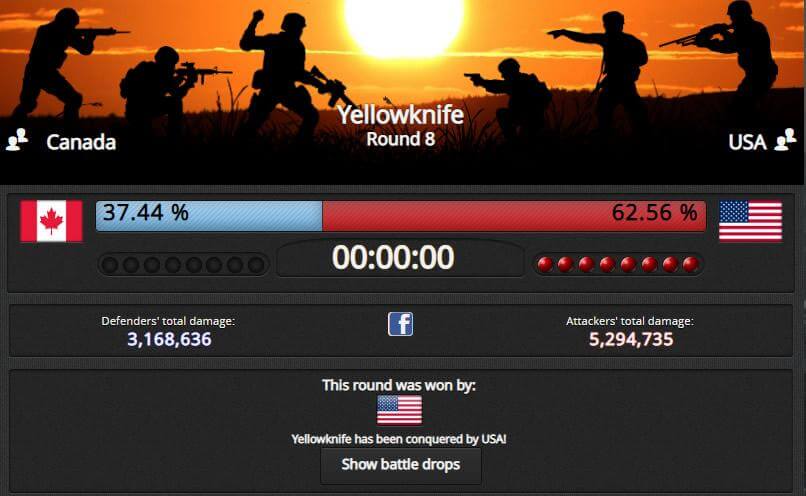
In E-Sim, international wars are nothing out of the ordinary.
Become an influential politician.
The second module is a politics. Just like in real life politics in E-Sim are an extremely powerful tool that can be used for your own purposes. From time to time there are elections in the game in which you will not only vote, but also have the ability to run for the head of the party you're in. You can also apply for congress, where once elected you will be given the right to vote on laws proposed by your fellow congress members or your president and propose laws yourself. Voting on laws is important for your country as it can shape the lives of those around you. You can also try to become the head of a given party, and even take part in presidential elections and decide on the shape of the foreign policy of a given state (for example, who to declare war on). Career in politics is obviously not easy and in order to succeed in it, you have to have a good plan and compete for the votes of voters.
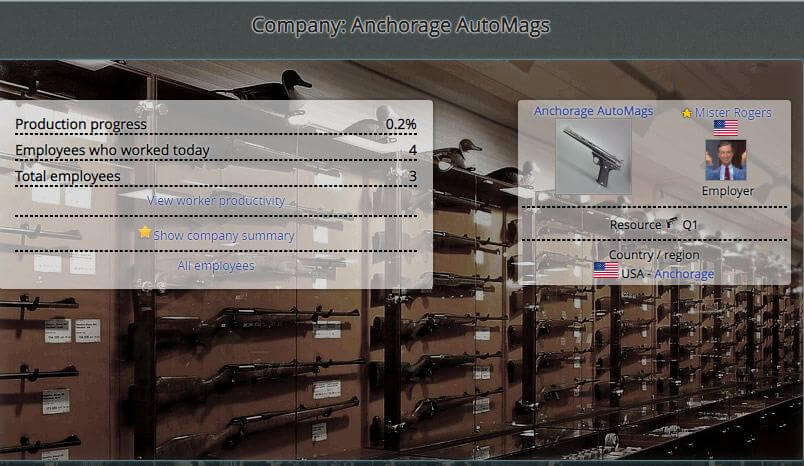
You can go bankrupt or become a rich man while playing the stock market.
The international war.
The last and probably the most important module is military. In E-Sim, countries are constantly fighting each other for control over territories which in return grant them access to more valuable raw materials. For this purpose, they form alliances, they fight international wars, but they also have to deal with, for example, uprisings in conquered countries or civil wars, which may explode on their territory. You can also take part in these clashes, although you are also given the opportunity to lead a life as a pacifist who focuses on other activities in the game (for example, running a successful newspaper or selling products).
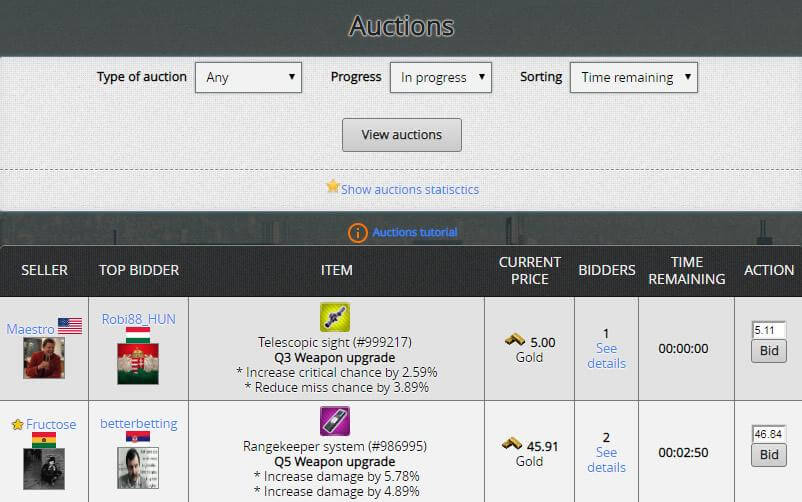
At the auction you can sell or buy your dream inventory.
E-Sim is a unique browser game. It's creators ensured realistic representation of the mechanisms present in the real world and gave all power to the players who shape the image of the virtual Earth according to their own. So come and join them and help your country achieve its full potential.
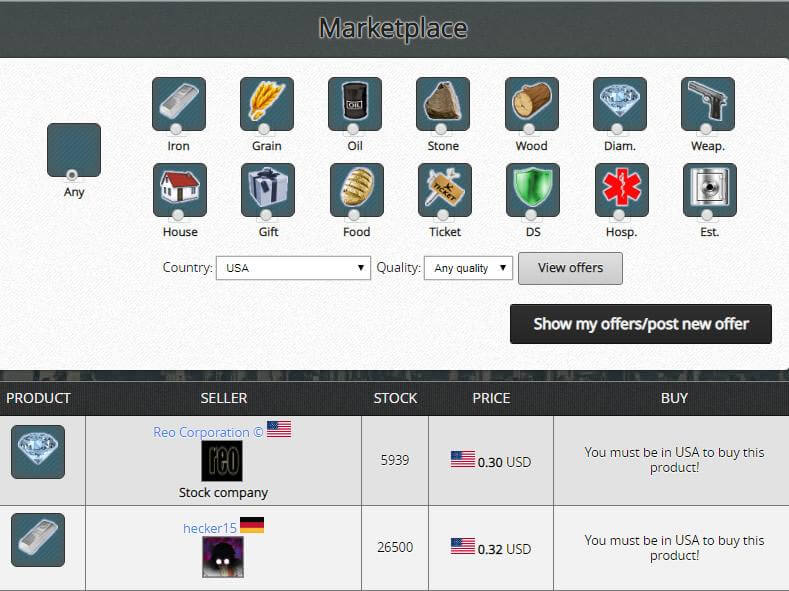
Invest, produce and sell - be an entrepreneur in E-Sim.
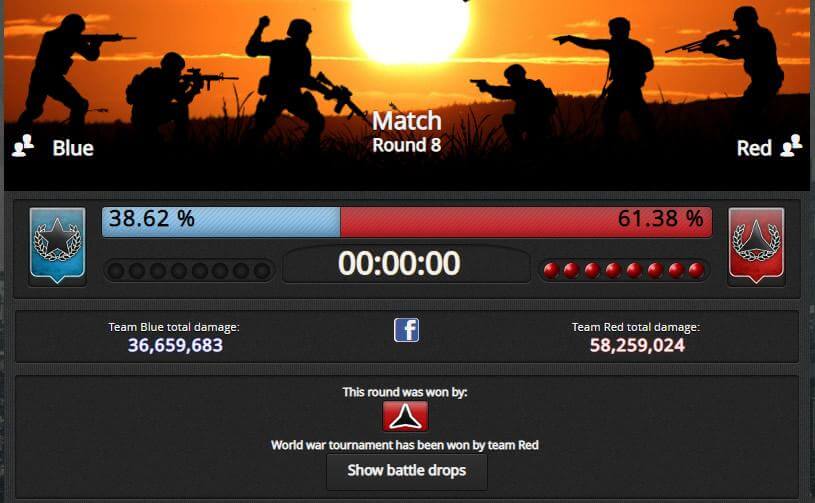
Take part in numerous events for the E-Sim community.
